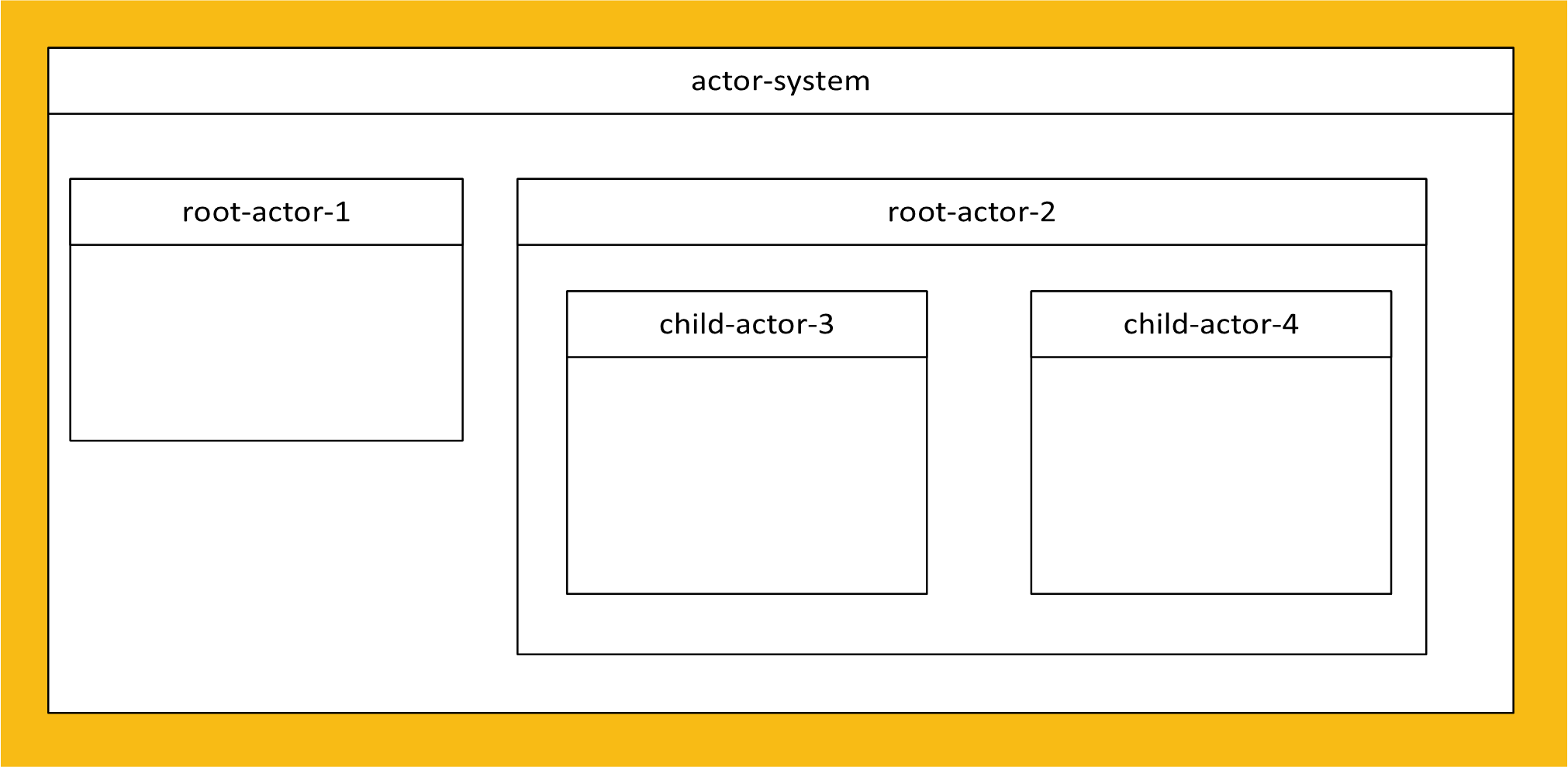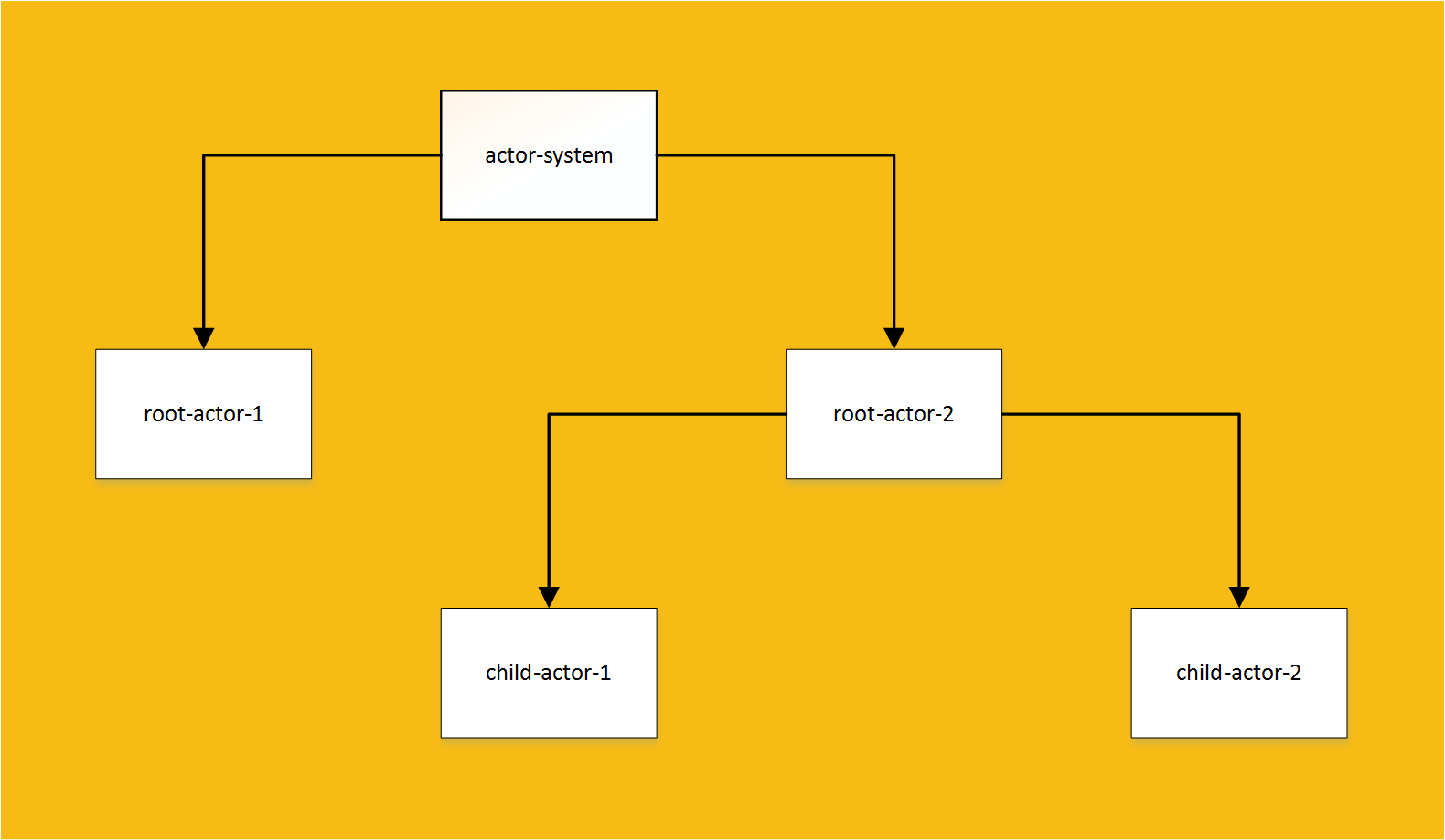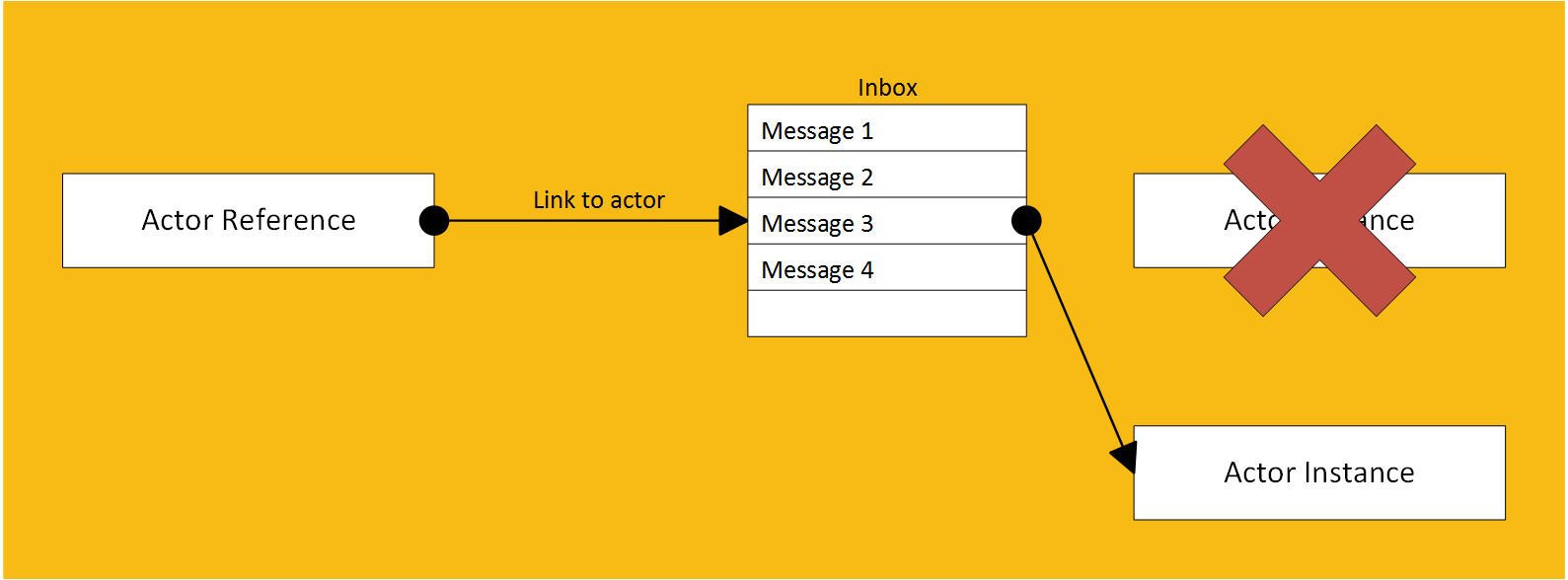You can do it

Put your Akka into it
Akka is an implementation of the "actor model" on .NET
What is the actor model?
- It is a way of structuring your app
- Instead of classes calling each other directly, they communicate via messages via a framework
- Classes that communicate in this manner are called Actors
Why use an actor model?
- Actors are thread safe
- Actors are asynchronous
- Actor frameworks tend to have great mechanisms for error handling
- Actors promote scalable and more loosely coupled systems
How the actor model relates to traditional code
- Think of an actor as a function and the message as its parameters
- What the function does depends on the type of message it receives
- When an actor sends a message to another actor, think of this as one function calling another
Actor hierarchy
- An actor can create other actors
- The newly created actor is called the child actor
- The actor that created it is called the parent actor
Actor hierarchy

Actor hierarchy

Error handling in actor hierarchies
- When an actor's child throws an unhandled exception it must decide what to do. It has three options:
- Restart all its child actors
- Just restart the failing child actor
- Escalate the error to its parent actor, who in turn has to the same three options
How are actors used?
You never instantiate an actor directly, you only ever hold a reference to it

How are actors used?
The actor reference is updated when an actor restarts due to an error

Starting your first actor
If actors create other actors, how do I crete my first actor?
Actor System
using System;
using Akka.Actor;
namespace AkkaExamples
{
internal class Program
{
private static ActorSystem _system;
private static void Main(string[] args)
{
_system = ActorSystem.Create("example-name");
Console.CancelKeyPress += (sender, eventArgs) =>
{
eventArgs.Cancel = true; // Cancelling the event prevents the process terminating too early
_system.Terminate();
};
_system.WhenTerminated.Wait();
}
}
}
Actors in the Actor System
- Actors created directly inside the Actor System are called Root Actors as they do not have a parent
- You can have multiple root actors
Instantiating Actors
- Instantiating/starting an actor in Akka can be done in one of two places:
- In the ActorSystem (for creating root actors)
- Inside Actors (for creating child actors)
- Both places expose the same function to achieve this
Actor Of
using System;
using Akka.Actor;
namespace AkkaExamples
{
internal class Program
{
private static ActorSystem _system;
private static void Main(string[] args)
{
_system = ActorSystem.Create("example-name");
Console.CancelKeyPress += (sender, eventArgs) =>
{
eventArgs.Cancel = true;
_system.Terminate();
};
//Create root actor
IActorRef rootActor = _system.ActorOf(Props.Create(() => new ExampleRootActor()), "example-root-actor-name");
_system.WhenTerminated.Wait();
}
}
}
Sending Messages
public class ExampleMessage
{
public ExampleMessage(string exampleData)
{
ExampleData = exampleData;
}
public string ExampleData {get; }
}
IActorRef rootActor = _system.ActorOf(Props.Create(() => new ExampleRootActor()), "example-root-actor-name");
//Send message to root actor via actor ref
rootActor.Tell(new ExampleMessage("Example message information"));
Writing your own Actor
public class ExampleRootActor : ReceiveActor
{
public ExampleRootActor()
{
// Run the following lambda when a message is sent to this actor of type ExampleMessage
Receive<ExampleMessage>(m => ReceiveExampleMessage(m));
}
private void ReceiveExampleMessage(ExampleMessage exampleMessage)
{
Console.WriteLine(exampleMessage.ExampleData);
}
public class ExampleMessage
{
public ExampleMessage(string exampleData)
{
ExampleData = exampleData;
}
public string ExampleData {get; }
}
}
Child Actors
public class ExampleRootActor : ReceiveActor
{
private readonly IActorRef _exampleActorRef;
public ExampleRootActor()
{
// Create child actor
_exampleActorRef = Context.ActorOf(Props.Create(() => new ExampleChildActor()), "example-child-actor");
// Send child actor a message
_exampleActorRef.Tell(new ExampleMessage("Example message information"));
}
}
Sending messages to parent
public class ExampleChildActor : ReceiveActor
{
public ExampleChildActor()
{
Receive<ExampleMessage>(m => ReceiveExampleMessage(m));
}
private void ReceiveExampleMessage(ExampleMessage exampleMessage)
{
// Process message
Console.WriteLine(exampleMessage.ExampleData);
// Send a new message to parent actor
Context.Parent.Tell(new ExampleSuccessMessage());
}
public class ExampleSuccessMessage { }
}
Sending messages to self
public class ExampleSelfTellActor : ReceiveActor
{
public ExampleSelfTellActor()
{
Receive<ExampleMessage>(m => ReceiveExampleMessage(m));
Receive<ExampleSelfMessage>(m => ReceiveExampleSelfMessage(m));
}
private void ReceiveExampleMessage(ExampleMessage exampleMessage)
{
// Process message
Console.WriteLine(exampleMessage.ExampleData);
// Send a new message to self
Self.Tell(new ExampleSelfMessage());
}
private void ReceiveExampleSelfMessage(ExampleSelfMessage exampleSelfMessage)
{
// TODO Process message sent to self here
}
public class ExampleMessage
{
public ExampleMessage(string exampleData)
{
ExampleData = exampleData;
}
public string ExampleData {get; }
}
private class ExampleSelfMessage { }
}
Replying to messages
public class ExampleReplyActor : ReceiveActor
{
public ExampleReplyActor()
{
Receive<ExampleRequestMessage>(m => ReceiveExampleRequestMessage(m));
}
private void ReceiveExampleRequestMessage(ExampleRequestMessage exampleMessage)
{
// Reply to message
Context.Sender.Tell(new ExampleResponseMessage($"Successfully replying to message: {exampleMessage.ExampleData}"));
}
public class ExampleRequestMessage
{
public ExampleRequestMessage(string exampleData)
{
ExampleData = exampleData;
}
public string ExampleData {get; }
}
public class ExampleResponseMessage
{
public ExampleResponseMessage(string exampleData)
{
ExampleData = exampleData;
}
public string ExampleData {get; }
}
}
Receiving Replies
public class ExampleAskActor : ReceiveActor
{
private readonly IActorRef _exampleReplyActorRef;
public ExampleAskActor()
{
ReceiveAsync<Start>(ReceiveStartAsync);
_exampleReplyActorRef = Context.ActorOf(Props.Create(() => new ExampleReplyActor()), "example-reply-actor-name");
}
private async Task ReceiveStartAsync(Start start)
{
ExampleReplyActor.ExampleResponseMessage result = await _exampleReplyActorRef.Ask<ExampleReplyActor.ExampleResponseMessage>(new ExampleReplyActor.ExampleRequestMessage("Hello, World"));
// The following will print "Successfully replying to message: Hello, World"
Console.WriteLine(result.ExampleData);
}
public class Start { }
}
Behaviours
public class ExampleBehaviorActor : ReceiveActor
{
public ExampleBehaviorActor()
{
Become(Starting);
}
private void Starting()
{
Receive<ExampleMessageType1>(m => ReceiveExampleMessageType1(m));
}
private void Started()
{
Receive<ExampleMessageType2>(m => ReceiveExampleMessageType2(m));
}
private void ReceiveExampleMessageType1(ExampleMessageType1 exampleMessage)
{
//TODO: do something with first message type that would make actor ready for second message type
Become(Started);
}
private void ReceiveExampleMessageType2(ExampleMessageType2 exampleMessage)
{
//TODO: do something with second message type
}
public class ExampleMessageType1 { }
public class ExampleMessageType2 { }
}
Stashing
public class ExampleStashActor : ReceiveActor, IWithUnboundedStash
{
public IStash Stash {get; set; } // Property to implement IWithUnboundedStash
public ExampleStashActor()
{
Become(Starting);
}
private void Starting()
{
Receive<ExampleMessageType1>(m => ReceiveExampleMessageType1(m));
Receive<ExampleMessageType2>(m => Stash.Stash()); // Stash ExampleMessageType2 when starting
}
private void Started()
{
Receive<ExampleMessageType2>(m => ReceiveExampleMessageType2(m));
Stash.UnstashAll(); // Unstash stashed messages when started
}
private void ReceiveExampleMessageType1(ExampleMessageType1 exampleMessage)
{
//TODO: do something with first message type that would make actor ready for second message type
Become(Started);
}
private void ReceiveExampleMessageType2(ExampleMessageType2 exampleMessage)
{
//TODO: do something with second message type
}
public class ExampleMessageType1 { }
public class ExampleMessageType2 { }
}
PipeTo
public class ExamplePipeToActor : ReceiveActor
{
private readonly IThingyDoer _thingyDoer;
public ExamplePipeToActor(IThingyDoer thingyDoer)
{
_thingyDoer = thingyDoer;
Receive<ExampleRequestMessage>(m => ReceiveExampleRequestMessage(m));
Receive<ExampleResponseMessage>(m => ReceiveExampleResponseMessage(m));
}
private void ReceiveExampleRequestMessage(ExampleRequestMessage request)
{
_thingyDoer
.DoAsync(request.ExampleData)
.ContinueWith(
task => new ExampleResponseMessage(task.Result),
TaskContinuationOptions.ExecuteSynchronously)
.PipeTo(Self);
}
private void ReceiveExampleResponseMessage(ExampleResponseMessage response)
{
Console.WriteLine(response.ExampleData);
}
public class ExampleRequestMessage
{
public ExampleRequestMessage(string exampleData)
{
ExampleData = exampleData;
}
public string ExampleData {get; }
}
private class ExampleResponseMessage
{
public ExampleResponseMessage(string exampleData)
{
ExampleData = exampleData;
}
public string ExampleData {get; }
}
}
Bells & Whistles
public class DownloadActor : ReceiveActor, IWithUnboundedStash
{
private HttpClient _client;
public DownloadActor()
{
Become(Idle);
}
public IStash Stash {get; set; }
protected override void PreStart()
{
_client = new HttpClient();
base.PreStart();
}
protected override void PostStop()
{
_client.Dispose();
base.PostStop();
}
private void Idle()
{
Receive<Download>(start =>
{
_client
.GetAsync(start.Url)
.PipeTo(
Self,
Self,
httpRes => new DownloadComplete(httpRes.Content),
exception => new DownloadFailure());
Become(Downloading);
});
}
private void Downloading()
{
ReceiveAsync<DownloadComplete>(async download =>
{
string content = await download.Content.ReadAsStringAsync();
Context.Parent.Tell(new DownloadResult(content));
Stash.UnstashAll();
Become(Idle);
});
Receive<DownloadFailure>(failure =>
{
Context.Parent.Tell(failure);
Stash.UnstashAll();
Become(Idle);
});
Receive<Download>(start => Stash.Stash());
}
public class Download
{
public string Url {get; }
public Download(string url)
{
Url = url;
}
}
private class DownloadComplete
{
public HttpContent Content {get; }
public DownloadComplete(HttpContent content)
{
Content = content;
}
}
public class DownloadResult
{
public string Content {get; }
public DownloadResult(string content)
{
Content = content;
}
}
public class DownloadFailure { }
}